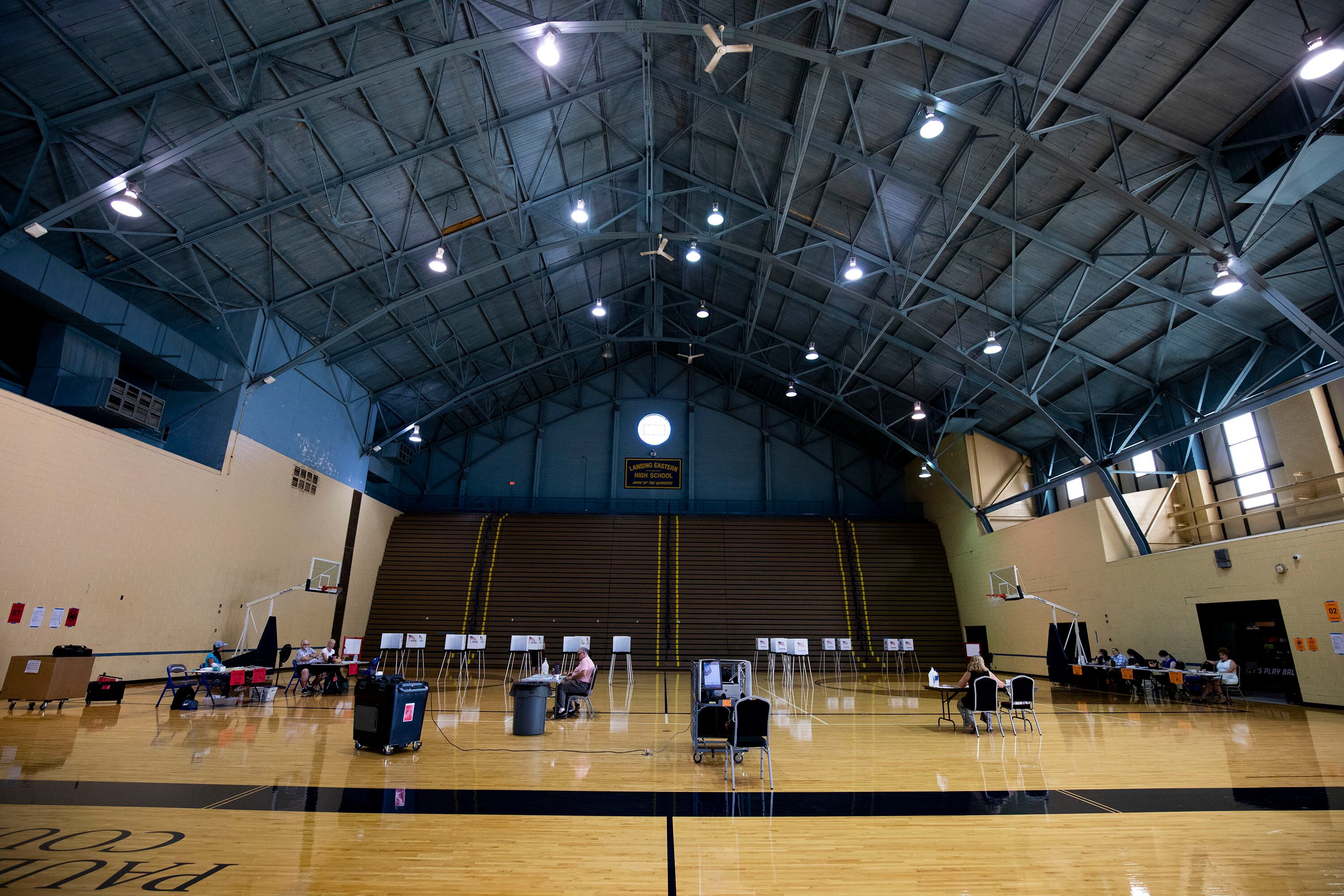Many of the candidates running to fill four seats on the Detroit school board agree that there is no issue more important than getting students to school consistently. But the candidates have varying thoughts on how to solve the chronic absenteeism problem in city schools.
The issue came up repeatedly Thursday in a candidate’s forum that gave Detroit residents an opportunity to hear directly from 15 of the 18 people who are vying for four seats with four-year terms on the Detroit Public Schools Community District board of education. The forum was hosted by Chalkbeat Detroit and WDET 101.9 FM.
Nearly 80% of the students in the Detroit district were identified as chronically absent at the end of last school year — meaning they missed 10% or more of their school days. The rate has surged since the start of the pandemic, thanks in part to quarantining rules that required many students to stay home if they were exposed to COVID-19.
High rates of chronic absenteeism have been a perennial problem in the district, and school leaders have tried a number of solutions, such as hiring attendance agents to visit homes and find children. But after the pandemic disrupted education and led to learning loss, the problem has become more urgent. Superintendent Nikolai Vitti has said over and over that the district’s broader reform efforts won’t work if kids aren’t consistently coming to school.
During a lightning round in Thursday’s forum, Chalkbeat and WDET asked the candidates what one thing should be done that the district isn’t doing to address chronic absenteeism. Below is a recap of how candidates answered the question in the 30 seconds they had to respond.
You can watch the full video to hear what they had to say on issues such as learning loss, teacher retention, transportation, and more. You can learn more about their views on other issues by reading our voter guide.
The forum included two separate panel discussions because of the large number of candidates. Moderators included Ethan Bakuli, a reporter who covers the Detroit district for Chalkbeat Detroit; Hafiza Khalique, a senior at Cass Technical High School and a community organizer; Mi’Joy Reed-Nash, a senior at Martin Luther King Jr. Senior High School who is also a student journalist and musical artist; and Sascha Raiyn, an education reporter for WDET 101.9 FM, Detroit’s NPR station.
Two candidates — incumbent Georgia Lemmons and Reba Neely — did not RSVP for the forum. Candidate Patrice Douglas was too ill to attend.
Learning why students aren’t coming to school
Regina Ann Campbell, president and CEO of Build Institute, said it’s “important to understand the root causes.” The district, she said, needs to do that “to determine what is the best solution or path forward.”
“We have data,” said Bessie Harris, a retired educator. “We know where those students are. We know the ones who have the problem with coming to school. Let’s go out and find out why.”
The reasons students miss school are varied and include everything from lack of consistent transportation to housing instability. The idea that parents don’t want their children in school or don’t care about attendance “could not be further from the truth,” researcher Sarah Lenhoff, an associate professor at Wayne State University’s College of Education, told Chalkbeat this summer, adding: “Families want their kids to be in school.”
Knocking on doors to find students
Some of the ideas offered by the board candidates mirrored initiatives the district already has in place, such as a door-knocking campaign that was ramped up during the pandemic.
“Right now we have to have an urgency around getting to the students that are missing,” said Latrice McClendon, a district parent and the community president for Huntington Bank in Detroit.
“We need to go to their last known address, we need to get to their last known phone number, we need to get in communication with whoever we can … to understand where our students are. We just need to get this work done in this area,” McClendon said.
“We need to have a parent and community corps that goes out door to door,” said Lamar Lemmons, chief of staff for a state senator and former school board member. “We have to know where our students are and what conditions they’re living under and how to remediate those conditions. We have to move rapidly into doing so.”
Ridgeley Hudson said that during the pandemic, “I was one of those individuals that went out to canvass and knock on doors to ask individuals: Were they OK? We should revisit that.”
Hudson said that while meeting families in their homes and finding out why students are absent, the district must also determine “the needs of those students and provide wraparound services to ensure that we could close that gap so we can ensure our students are in school and are actually learning.”
Giving families the help they need
Candidates said that the district should work to ensure students and their families have access to resources that will help get kids to school.
“We also need to have more wraparound services, not just for the student himself or herself, but for the entire family,” said Ida Simmons Short, an educator and former school board member.
Iris Taylor, a health consultant and administrator of clinical services for the Detroit Health Department, suggested a health hub to provide physical, mental health, and dental health services as needed.
In addition, schools need a parent advocate “and someone who can reach out to help facilitate resources in the community to connect with families,” said Taylor, a former school board member. That kind of help, she said, “will prevent some of the things that from occurring that are deterrents to kids coming to school.”
Transportation is an area the district must invest in, said Jamaal Muhammad, an attendance agent in the district who has also been an elementary teacher.
Attendance agents, he said, need to be able to “assist parents with transportation (via vans) and gas cards and the resources they need to make sure their students get to school.”
Investing more in attendance efforts
Some of the candidates said the district’s attendance office needs more staffing. Richard Clement, an educator, suggested the district needs to fund its efforts “a little bit better than we’re doing now” to decrease absences.
“We need to strengthen the attendance department, obviously,” said John Telford, the DPSCD poet in residence and a longtime educator. “We need to hire more attendance officers … . We need a wraparound program that encompasses the entire school and families. This is a serious, serious problem, because you can’t teach an empty chair. We’ve got to motivate kids too, particularly at the secondary level.”
Aliya Moore, a district parent and a vocal critic of the district’s board and administration, said that instead of spending $700 million on facilities (as the district plans to do to address longstanding problems with school buildings), the district should have spent more on attendance officers. Moore raised a concern that enrollment losses might force the district to lay off some of its attendance agents.
Incumbent Angelique Peterson-Mayberry, the board president, said attendance agents “are doing an amazing job of going to identify where these young people are. I was at a school the other day, and the attendance agents were going to homes and picking students up.”
Getting creative, and reinforcing the value of education
Another incumbent, Deborah Hunter-Harvill, called for new solutions.
“I would say at this time that maybe we need to have a little more creativity as it relates to getting students to come to school. We have vans and buses. We’re doing that part right,” said Hunter-Harvill, an education consultant and longtime educator. “We’re trying to enable our kids and get them here. But back in the day, we used to give incentives like movie passes or family Dairy Queen tickets.”
Many of the suggestions made during the forum cost money, said incumbent Corletta Vaughn, a bishop who leads the Go Tell It Ministry and the Holy Ghost Cathedral Church.. That raises a key issue about equity, she said.
Monique Bryant, executive director of the Triangle Society, didn’t say specifically what she would do to decrease chronic absenteeism. But her message was simple:
“We need to reestablish the value of a quality education.”
Lori Higgins is bureau chief for Chalkbeat Detroit. You can reach her at lhiggins@chalkbeat.org.





